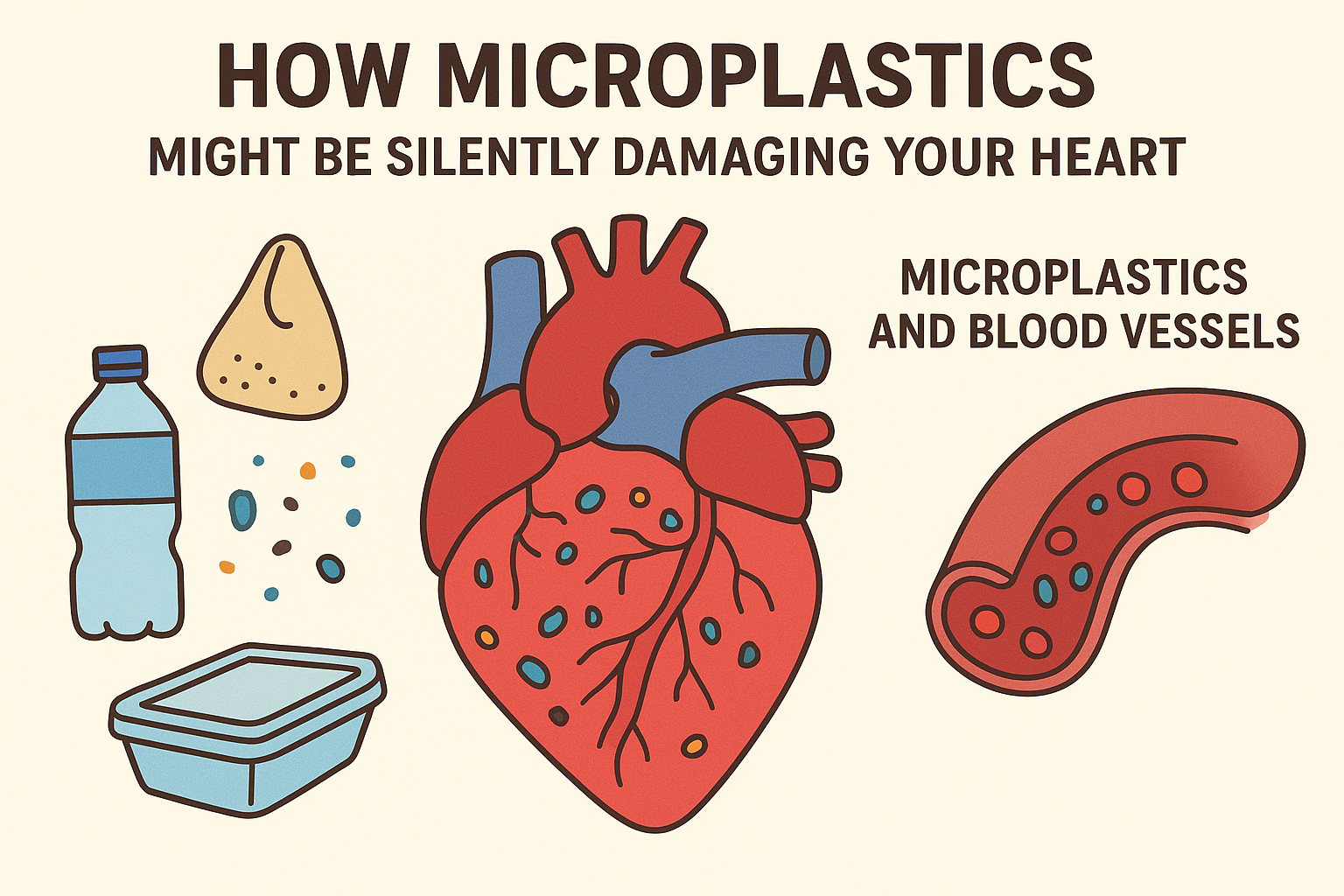Do Salt Alternatives improve your Heart Health?

High blood pressure is a major dietary driver of cardiovascular disease. For decades, public health advice has been simple: eat less salt. Yet this is easier said than done, as sodium is hidden in processed foods and restaurant meals.
In recent years, a new approach has emerged — not just reducing sodium, but replacing some of it with potassium through low-sodium or potassium-enriched salt substitutes. These alternatives have now been extensively studied.
This article reviews the clinical evidence and addresses key questions:
- Does adding salt to your meals increase the risk of heart attack or heart failure?
- How does salt affect blood pressure?
- What impact do salt substitutes have on heart health?
Take home messages:
- Replacing ordinary salt (sodium chloride) with potassium-enriched salt substitutes lowers blood pressure and — in large randomized trials — reduced stroke, major cardiovascular events and all-cause mortality.
https://www.nejm.org/doi/full/10.1056/NEJMoa2105675?utm
- A major cluster randomized trial (the SSaSS study) in China found a salt substitute (≈25% potassium chloride) reduced cardiovascular events.
https://www.ahajournals.org/doi/10.1161/HYPERTENSIONAHA.123.22410
- Much of the effect appears driven by increased potassium intake rather than sodium reduction alone. That is, potassium salt benefits extend beyond simply cutting sodium.
https://www.nature.com/articles/s41371-024-00896-4?utm_
- Patients with advanced kidney disease, those taking potassium-sparing medicines, or those on high-dose potassium supplements need caution — potassium excess (hyperkalemia) is the major safety concern.
https://www.ahajournals.org/doi/10.1161/HYPERTENSIONAHA.119.13241
- Global health organisations (including WHO) now support replacing regular table salt with lower-sodium, potassium-enriched alternatives as a population strategy — but implementation should include warnings for at-risk groups.
https://www.who.int/news-room/fact-sheets/detail/sodium-reduction?utm_
Why replace salt instead of just eating less of it?
Sodium (Na⁺) raises blood pressure by increasing fluid retention and altering vascular function; high BP is a leading risk factor for stroke, coronary heart disease and heart failure. Public health campaigns and reformulation efforts have had some success in reducing sodium intake in places where processed food producers cooperate, but globally average intake remains well above recommended levels.
A high proportion of sodium in our diet comes from processed foods and restaurants, not the saltshaker.
A complementary, pragmatic strategy is to swap regular table salt for low sodium substitutes — blends where a portion of sodium chloride is replaced with potassium chloride.
Why potassium? As an electrolyte, potassium opposes many of sodium’s harmful cardiovascular effects. In the case of salt substitutes, the benefit comes from both lowering sodium and increasing potassium.
Research Evidence
The Salt Substitute and Stroke Study (SSaSS) (NEJM, 2021)
The most influential randomized evidence is the Salt Substitute and Stroke Study (SSaSS), a cluster-randomized trial that enrolled about 21,000 adults in rural China and followed them for ~5 years. Households were randomized to receive a salt substitute (about 75% sodium chloride + 25% potassium chloride) or continue with regular salt. The trial found that the salt substitute group had a significant reduction in stroke, major cardiovascular events and all-cause mortality compared with regular salt. Crucially, the trial also demonstrated systolic BP reductions, and the investigators reported no overall increase in clinically detected hyperkalemia events in the population they studied (people with severe kidney disease were largely excluded).
https://www.nejm.org/doi/full/10.1056/NEJMoa2105675?utm_
Meta-analyse and systematic review
Published in 2022 concluded, that the use of a salt substitute significantly lowers blood pressure and reduces all-cause mortality. Incorporating salt substitutes into the daily diet offers an effective, non-pharmacological approach to improving blood pressure control.
https://pubmed.ncbi.nlm.nih.gov/36196475/
Recent secondary and subgroup analyses
Secondary analyses of SSaSS and related studies have explored whether the benefit differs by age, baseline blood pressure, or medication use; several analyses suggest the greatest absolute benefit is in higher-risk groups (older adults, people with hypertension). Analyses attempting to separate the sodium-reduction effect from the potassium-increase effect suggest a substantial portion of the BP and outcome benefit is driven by the potassium component. In other words, potassium salt benefits are not just theoretical — they appear to be major contributors to improved outcomes.
https://www.nature.com/articles/s41371-024-00896-4?utm_
Mechanisms: how does a salt substitute improve heart health?
There are two complementary mechanisms:
- Lower sodium intake — reduces fluid retention and lowers blood pressure, which in turn reduces the risk of stroke and heart disease. Even modest average reductions in systolic BP at the population level translate into meaningful declines in stroke and heart attack rates.
- Higher potassium intake — potassium directly affects vascular tone, sodium excretion, and counteracts sodium’s pressor effects.
Physiologically, increased dietary potassium enhances natriuresis (sodium excretion), improves endothelial function, and modulates sympathetic activity — all cardioprotective effects.
Benefits quantified: how big are the effects?
- Blood pressure: Randomized trials and meta-analyses generally find modest but clinically meaningful reductions in systolic BP (commonly a few mmHg on average). Even small average BP reductions across a population materially reduce stroke incidence. PMC
- Stroke and cardiovascular events: The SSaSS trial reported a reduction in stroke incidence and a composite of major cardiovascular events; pooled meta-analyses also show lower rates of total mortality and cardiovascular outcomes in salt-substitute users. Exact effect sizes vary by study and population, but the direction is consistent.
Risks and safety — the hyperkalemia (high potassium levels) question
The major safety concern with potassium-enriched salt is hyperkalemia (dangerously high blood potassium), which can cause cardiac arrhythmias. Several important caveats:
- Trials typically excluded people with advanced chronic kidney disease (CKD) and those taking potassium-sparing agents.
Who should (and should not) use potassium-enriched or low-sodium substitutes?
Good candidates:
- Adults at risk of high blood pressure or cardiovascular disease who do not have advanced kidney disease, and who are not taking potassium-raising medications. These people are most likely to gain net benefit. New England Journal of MedicinePMC
Exercise caution / consult a clinician:
- Patients with Chronic Kidney Disease (moderate to severe), those on ACE inhibitors, ARBs, spironolactone/eplerenone, potassium supplements, or those with other conditions affecting potassium handling. For these patients, a personalized risk assessment is essential before switching.
Practical options: what are the alternatives to regular salt?
When people talk about sodium alternatives, they usually mean one (or more) of the following:
- Potassium-enriched salt substitutes (common composition: ~70–80% NaCl + 20–30% KCl). These are the products tested in trials like SSaSS. They taste similar to salt and can be used in home cooking and at the table. New England Journal of Medicine
- Low-sodium sea salts and “lite” salts — marketing names vary; these may be mostly NaCl but with reduced sodium content or added minerals.
Further useful recommendations can be also found on this WHO website:
https://www.who.int/news-room/fact-sheets/detail/sodium-reduction?utm_
Conclusion
Can “Smart Salt” help reduce cardiovascular risk and prevent so-called salt heart disease? Current evidence — led by the SSaSS trial and reinforced by systematic reviews — suggests the answer is yes. Replacing part of sodium chloride with potassium chloride in table salt lowers blood pressure and has been linked to fewer strokes, cardiovascular events, and deaths in trial settings. These findings have led global bodies, including the WHO, to endorse potassium-enriched, reduced-sodium salt substitutes as part of wider sodium-reduction strategies.
That said, safety matters. For patients with advanced kidney disease or those taking potassium-raising medications, the risk of hyperkalemia is real. Effective implementation therefore requires targeted screening, appropriate monitoring (including blood tests), and clear product labelling.
When introduced thoughtfully, salt substitution offers a low-cost, scalable, and impactful tool to reduce the global burden of salt-related cardiovascular disease. Introduced carelessly, it risks preventable harm to vulnerable groups.
Additional Questions
Does adding salt to your meals increase the risk of heart attack and heart failure?
Yes. A December 2022 study in the Journal of the American College of Cardiology found a strong association between added salt and cardiovascular risk (https://www.jacc.org/doi/epdf/10.1016/j.jacc.2022.09.039).
- Participants: 175,670 adults without prior cardiovascular disease, followed for a median of 11.8 years.
- Outcomes: 9,963 cardiovascular events:
- 6,993 cases of ischemic heart disease (angina and heart attacks)
- 2,269 cases of heart failure
- 2,007 strokes
- Findings: Lower frequency of adding salt correlated with lower cardiovascular risk.
- Hazard ratios: 0.81 (usually), 0.79 (sometimes), 0.77 (rarely/never) (p < 0.001).
- Key point: Extra salt had the strongest link to heart failure, followed by coronary heart disease, but not stroke.
How does salt affect blood pressure?
A JAMA study (Nov 2023) showed that reducing dietary sodium significantly lowers blood pressure (https://jamanetwork.com/journals/jama/article-abstract/2811931).
- Design: U.S. trial (Apr 2021 – Feb 2023), >200 participants aged 50–75.
- Groups:
- Low-sodium diet: 500 mg/day
- High-sodium diet: 2200 mg/day
- Results:
- Low-salt diet reduced systolic BP by ~8 mmHg within one week — an effect similar to antihypertensive medication.
- 75% of participants experienced a reduction, regardless of baseline BP or medication use.
- Conclusion: Sodium reduction lowered BP across subgroups without excess adverse events.
What are the effects of salt substitutes on heart health?
A meta-analysis (April 2024, Annals of Internal Medicine) reviewed the impact of potassium-enriched salt substitutes (https://www.acpjournals.org/doi/10.7326/M23-2626).
- Evidence base: 16 randomized controlled trials; 8 with follow-up ≥6 months.
- Populations: Mostly Chinese/Taiwanese adults (mean age 62).
- Findings:
- Possible reduction in all-cause and cardiovascular mortality (low-certainty evidence).
- Slight reduction in major adverse cardiovascular events (very low-certainty evidence).
- Conclusion: Salt substitutes may improve outcomes, but evidence is limited outside high-risk, Asian populations. Certainty remains low for Western diets.











